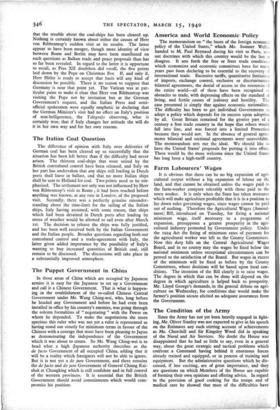Farm Labourers' Wages
It is obvious that there can be no big expansion of agri- cultural output without a big expansion of labour on the land, and that cannot be obtained unless the wages paid to the farm-worker compare tolerably with those paid to the town worker. It is only when the State has taken measures which will make agriculture profitable that it is in a position to lay down rules governing wages, since wages cannot be paid out of nothing. Therefore the Agricultural Wages (Amend- ment) Bill, introduced on Tuesday, for fixing a national minimum wage, itself necessary to a programme of expansion, presupposes a greater prosperity in the agri- cultural industry promoted by Government policy. Under the 1924 Act the fixing of minimum rates of payment for the agricultural worker was left to the County Committees. Now this duty falls on the Central Agricultural Wages Board, and in no county may the wages be fixed below the national minimum unless exceptional circumstances can be proved to the satisfaction of the Board. But wages in excess of the minimum will be fixed as before by the County Committees, whose decisions will be based upon local con- ditions. The intention of the Bill clearly is to raise wages. The degree in which that can be done will depend on the degree in which agriculture is helped back to prosperity. Mr. Lloyd George's demands, in the general debate on agri- culture on Wednesday, for conditions that would make the farmer's position secure elicited no adequate assurances from the Government.






















































 Previous page
Previous page